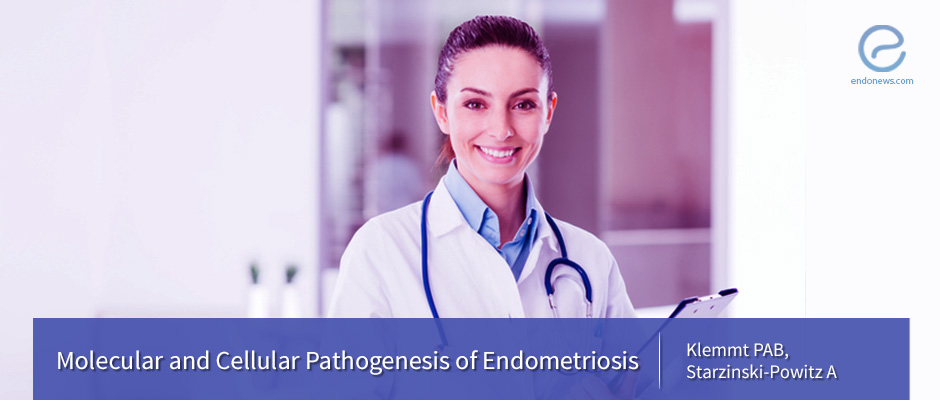The pathogenesis of endometriosis : New discoveries with clinical impact
Jul 18, 2018
There is a great deal of new progress in molecular and cellular aspects on the theories of endometriosis with potential research gateways
Key Points
Highlights:
- Recent molecular and cellular features of endometriotic lesions show different properties from those of eutopic endometrium, and also differs from that of females without endometriosis
- Molecular hallmarks of endometriosis comprise a hormone-dependent (estrogen-dependent, progesterone resistant) inflammatory condition with an (epi)genetic predisposition
- Aberrant expression profiles with a number of non-steroid signaling pathways exert their putative influence on the pathogenesis of endometriosis
Importance:
- Recent biological concepts like exosomes and microRNAs are potential clinically relevant hot research topics in the pathogenesis of endometriosis
What's done here:
- In this review article, the authors have compiled all relevant contemporary molecular and cellular discoveries in the pathogenesis of endometriosis
Data:
- Authors first summarized the current theories on the pathogenesis of endometriosis, and irrespective of the mechanism, they presumed that lesions of different locations (peritoneal, ovarian, rectovaginal) may have a discrete pathogenesis. Furthermore, they detailed the pivotal role of the microenvironment in the onset and progression and non-steroid cell signaling.
- Endometrial cell-derived vesicles (exosomes) even in the absence of menstruation may have an important role in both endometria, i.e. eutopic and ectopic
- Tissue injury and repair mechanisms besides non-steroid signaling are important in attachment and invasion of ectopic cells
Lay Summary
In this recent review article that appeared in Current Women’s Health Reviews, compiled by researchers from the Department of Molecular Cell Biology and Human Genetics, Institute of Cell Biology and Neuroscience Frankfurt, Germany the following important points in regard to the molecular and cellular pathogenesis of endometriosis were outlined.
In respect to a main implantation pathogenetic theory of endometriosis, the most likely explanation for the pathologic lesions of endometriosis shed menstrual endometrium is also flushed back into the pelvis. Menstrual cells can attach by gravity to the peritoneal surfaces and form temporary lesions but these are removed by the immune system. In women with endometriosis, these ectopic foci evade the immune surveillance and progress in response to e.g. locally present cytokines and/or growth factors.
After summarizing the current theories on the pathogenesis of endometriosis, authors presumed a discrete pathogenesis for lesions of different locations. Here they touch upon the role of the microenvironment in the onset and progression and non-steroid cell signaling.
Recently it has been found that endometrial exosomes (cell-derived vesicles) can also be transported retrogradely into the pelvic cavity even in the absence of menstruation and additionally these could also be transported back through the fallopian tubes into the uterine cavity thus modulating signaling events in eutopic endometrium also. Exosomes could also mediate metaplasia of peritoneal cells into an endometriotic tissue in some cases
The concept of tissue injury and repair mechanism (TIAR), suggests that trauma could cause the displacement of basal cells of the endometrium through altered uterine contractility. Also, the exposure of ectopic attachment sites (injury) could allow the attachment and invasion of ectopic cells followed by wound healing.
The canonical WNT/β-signaling pathway is a key regulatory system in biology (including stem cell homeostasis) and also important in endometriosis. Research on non-steroid signal pathways might be remunerative targets for the development and selection of novel therapeutics to treat endometriosis.
Research Source: https://www.ncbi.nlm.nih.gov/pubmed/?term=29861704
molecular cellular pathogenesis signal pathways exosomes TIAR wnt signaling menstruation microenvironment non-steroid injury

